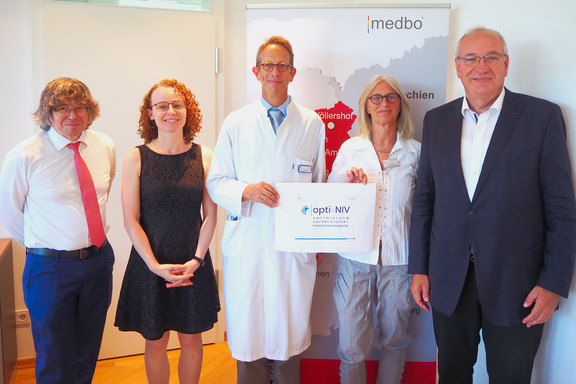Press release on OptiNIV from Regensburg, Germany

Breathing easier in the long term
The Bavaria-wide OptiNIV clinical study investigates how long-term ventilator patients can be helped to a new quality of life. "medbo neurology" forms study centre for the Eastern Bavaria region, seal of approval underlines expertise.
Regensburg, 26 September 2023
A serious car accident or a sudden stroke - and in a split second everything changes. Even with "luck of the draw", the nervous system can be immensely damaged. Even paralysis of the musculoskeletal system or even the respiratory muscles. The affected person becomes an intensive care patient and often remains so. Even after inpatient acute treatment and early rehabilitation, according to current surveys, around 30,000 people nationwide are dependent on mechanical ventilation or need a permanent access to the trachea. "We must make full use of all possibilities to help here," says Franz Löffler. For the district president, the district of Upper Palatinate, with its psychiatric and neurological care mandate, has a special responsibility: "After all, it's not just about participation, but above all about a minimum quality of life." medbo board member Dr Hausner adds: "Yet many of these people would have a very good chance of being able to breathe again, partially or even completely, literally." This is precisely where a Bavaria-wide clinical study comes in.
The project "Optimisation of post-hospital intensive care in neurological patients" (OptiNIV) was initiated by Prof. Andreas Bender at the Ludwig Maximilian University in Munich and at the Burgau Therapy Centre. The Clinic for Neurology of the University of Regensburg at the medbo District Hospital is the responsible study centre for the region of Eastern Bavaria. The local project leader is Prof. Felix Schlachetzki, head physician of the medbo Centre for Vascular Neurology & Intensive Care Medicine.
Innovative care interface
If mechanical ventilation is still necessary after a hospital stay, the so-called out-of-hospital intensive care (AIP) - colloquially also called "ventilation shared accommodation" - currently comes into play. "Unfortunately, there is often a lack of specially trained staff in community care," says Schlachetzki. But to maintain progress during inpatient and rehabilitative treatment, or ideally to achieve recovery, specialists are needed. "Specialists, specialist therapists and nurses specialised in neuro-rehabilitation who pull together as an interdisciplinary team," emphasises the head physician.
Because every advance is a gain in quality of life. Patients would not only be more mobile, but might also be able to talk or even eat again.The study is intended to investigate overlapping cooperation between inpatient, neurorehabilitative and AIP care, to discover gaps in care and to improve care. Because the goal is clear: to increase the success rates for ventilator weaning as well as for the closure of a permanent access to the trachea (decannulation).
Certified Weaning Centre in Regensburg
Currently, 67 patients of the study group are being cared for by outpatient special teams throughout Bavaria, 22 of them by medbo in Eastern Bavaria.These teams are formed by clinics such as medbo, which have expertise in the field of neurorehabilitative early rehabilitation.The medbo Centre for Vascular Neurology & Intensive Care Medicine specialises, among other things, in particularly severe neurorehabilitation cases (Phase B).In August 2022, the team of ward 14b was also certified as a so-called "Centre for respiratory weaning in neurological-neurosurgical early rehabilitation".This seal has only recently been awarded by the German Society for Neurorehabilitation (DGNR) and confirms special competences.
The ward team is trained to determine the individual weaning potential of long-term ventilated patients in order to be able to initiate weaning - also called "weaning" in technical language - at the earliest and best possible time."The longer ventilation continues, the more difficult it becomes to stop it," explains Prof. Schlachetzki.
Examine, coordinate, wean
"As part of the study, we regularly visit the ventilated study participants in the specialised care facilities, the AIPs, and conduct examinations there. In addition, the team - a doctor, a speech therapist and an intensive care nurse from ward 14b - coordinates the therapeutic concept," explains the medbo project manager. Doctors or outpatient care services on site thus receive so-called managed care plans.
Depending on the patient, a structured inpatient assessment can also be carried out at any time during the one-year study period. For this purpose, the patients are admitted to the rehabilitation clinic as inpatients for a short time: "If we determine in the process that weaning from the ventilator or from the tracheal cannula is realistically feasible, we can carry out a repeat inpatient rehabilitation at medbo for about three weeks." Here, special attention is paid to everyday activities: especially swallowing and speaking. Because these basic needs can also be impaired after long periods of ventilation. At the same time, it is important to avoid neurological, neurosurgical and internal complications, such as pneumonia.
Moving thinking outside the box
"Your project is moving," says District President Franz Löffler during the project presentation, "all the more reason for me to be convinced: this is exactly the kind of new path we need to take!" For he not only sees the bureaucratic barriers in the German health system as currently still too great. "On top of that, there is a lack of specialists for such intensive care cases, especially in rural areas."Of course, he is particularly pleased that medbo is once again taking on a pioneering role in the rehabilitation of respiratory patients and bringing specialised care to the people on site."You rarely find a care chain like this anywhere in Germany. From acute treatment to rehabilitation, our clinic for neurology at the Bezirksklinikum Regensburg is highly competent."With research projects such as OptiNIV, medbo and the University of Regensburg would not only ensure that this remains the case in the future, but rather make a significant contribution to the targeted and future-oriented further development of patient care."
The OptiNIV project
|